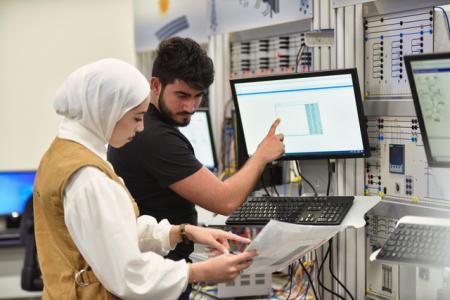
MDBs collective climate financing contributions set to hit $170 bn by 2030
The annual collective climate financing contributions from the group of multilateral development banks (MDBs) is ...

A new smart energy lab launched by Rochester Institute of Technology (RIT) Dubai signals a further step in the University’s commitment to help achieve the UAE’s future environmental sustainability goals. The new facility focuses on the application of smart grids technology, a key component of the national clean energy targets for 2050.
The lab, located within the University’s new campus development, has been established in collaboration with leading industry training systems provider, Lucas-Nuelle, and will promote teaching, research, and training to prepare the next generation of engineers for the future challenges in sustainable energy production and consumption. It provides students with a full hands-on simulation of an actual smart grid, and enables and experimentation in all aspects of the technology, from the generation and transmission of power, to its distribution and management.
As one of eight key components that make up a smart city, smart energy is a priority for the vision of H.H. Sheikh Mohammed bin Rashid Al Maktoum, Vice President and Prime Minister of the UAE and Ruler of Dubai, to create a world-leading city that ranks as the happiest on earth. The new facility aims to support the goals of both the UAE Energy Strategy and Dubai’s Clean Energy Strategy, which have set clear targets to reduce carbon emissions and increase the contribution of renewable fuel to the grid by 2050.
Explaining more about the technology, Dr Abdulla Ismail, Professor in the Department of Electrical Engineering at RIT Dubai, said, “The smart grid is the future of electrical energy, providing a more reliable, efficient, safe and cost-effective production and distribution system that incorporates sustainable power sources and supports the new generation of infrastructure and transportation.”
He continued, “Smart grids replace the traditional one-way power flow with a two-way system that allows for the active participation of energy consumers. This enables them to make sustainable choices about the source of their electricity supply, how they use it, and even provides the opportunity to sell domestically-produced power back into the grid, from roof-top solar panels, for example.”
The lab is already home to pioneering industry-relevant research projects in the field, among them the graduate thesis being conducted by Master of Electrical Engineering student, Venkateswara Rao Seshmasetti, a Power Systems Engineer with DEWA, who is exploring the application of artificial intelligence technology in localized microgrid systems.
Fellow graduate student and UAE national, Hamda Al Sharif, believes that the lab will be an important resource in helping to achieve Dubai’s future energy goals. She explained, “As a Plant Engineer with ENOC’s Dugas division, this facility will help me develop my knowledge and provide hands-on experience of how to implement and operate these systems so that I can help deploy them successfully within the organization. I am very proud of the progressive approach the UAE is taking to building a future driven by sustainable energy and I’m excited to be part of it.”
Speaking about the University’s strategic approach to the sustainability agenda, Dr Muhieddin Amer, Chair of Electrical Engineering and Computing Sciences at RIT Dubai said, “In collaboration with the main campus in New York we have placed a growing emphasis on education and research in the renewable energy field, through a range of academic courses and industry engagements. The new laboratory reflects the top-tier of power systems technology and will further support our goal to help facilitate the shift towards greener solutions for a sustainable future.”
The annual collective climate financing contributions from the group of multilateral development banks (MDBs) is ...
Sweden pledges additional $19 million to the Loss and Damage Fund at the 29th United ...
New Chief Executive Officer (CEO) DHL Express in the Middle East and North Africa(MENA) Abdulaziz ...


اترك تعليقا